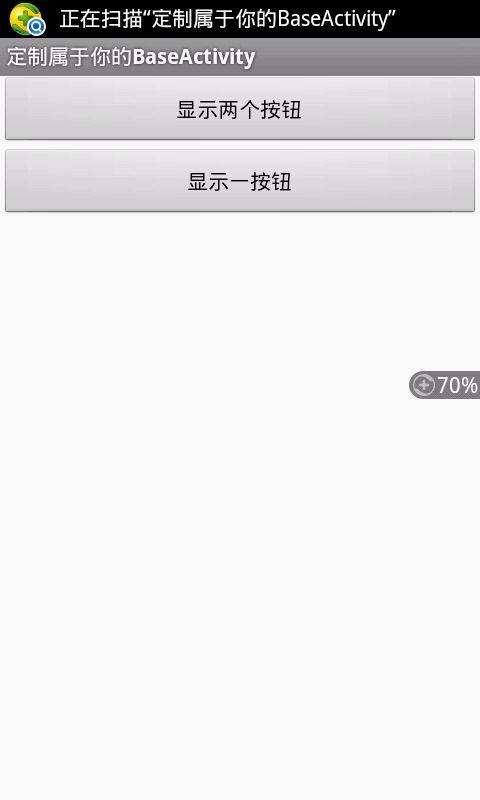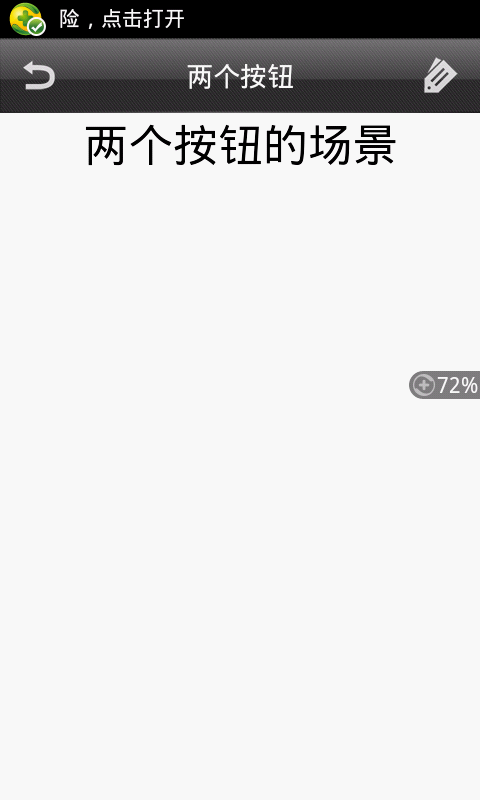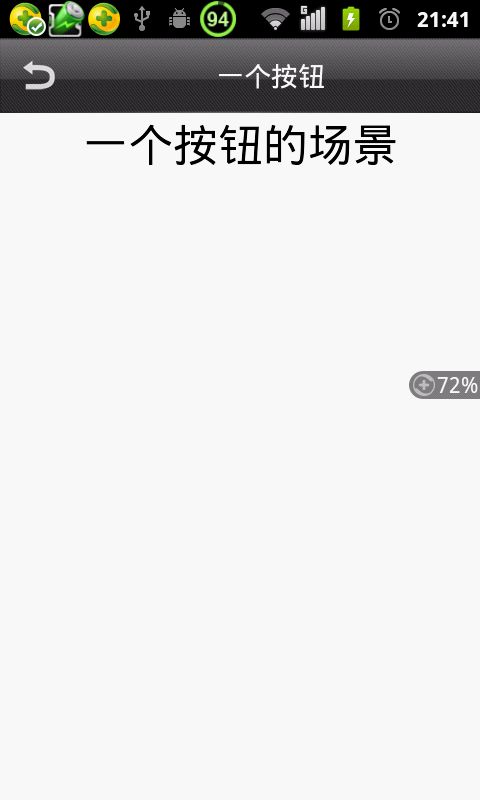为你的Android应用定制属于你的BaseActivity
相信大家在开发Android应用的过程中肯定碰到过很多重复的工作,写着重复的代码,有时候连布局文件也是一样,需要重复的劳动,那么这样对于我们程序来讲肯定是很累很繁琐的一件事,所以我们在写代码的时候是否需要去考虑让我们写更少的代码,程序员要学会偷懒,否则……..
在开发应用程序的时候我们的设计其实整体的样式是统一,那么我们就可以写一些公用的代码,这样对程序来讲也便于后面的维护,废话也不多说了,相信大家肯定也懂的,今天我分享给大家的就是定制一个属于自己的BaseActivity,这个BaseActivity主要封装了一些公用的代码,例如我们在开发过程中上面的那些标题和按钮肯定都要有的,所以我们可以把这些公用的都写在这个BaseActivity里,其他功能的Activity以后都继承这个BaseActivity.
先上效果图
效果图看了,大家是否有所启发或是有所了解呢?那么接下来就放BaseActivity里的核心代码咯:
/**
* 继承于Activity用于以后方便管理
*
* @author coder
*
*/
public class BaseActivity extends Activity {
private View titleView;
private TextView tv_title;
private Button btn_left, btn_right;
private LinearLayout ly_content;
// 内容区域的布局
private View contentView;
@Override
protected void onCreate(Bundle savedInstanceState) {
// TODO Auto-generated method stub
super.onCreate(savedInstanceState);
setContentView(R.layout.common_title);
titleView = findViewById(R.id.titleView);
tv_title = (TextView) titleView.findViewById(R.id.tv_title);
btn_left = (Button) titleView.findViewById(R.id.btn_left);
btn_right = (Button) titleView.findViewById(R.id.btn_right);
ly_content = (LinearLayout) findViewById(R.id.ly_content);
}
/***
* 设置内容区域
*
* @param resId
* 资源文件ID
*/
public void setContentLayout(int resId) {
LayoutInflater inflater = (LayoutInflater) getSystemService(Context.LAYOUT_INFLATER_SERVICE);
contentView = inflater.inflate(resId, null);
LayoutParams layoutParams = new LayoutParams(LayoutParams.FILL_PARENT,
LayoutParams.FILL_PARENT);
contentView.setLayoutParams(layoutParams);
contentView.setBackgroundDrawable(null);
if (null != ly_content) {
ly_content.addView(contentView);
}
}
/***
* 设置内容区域
*
* @param view
* View对象
*/
public void setContentLayout(View view) {
if (null != ly_content) {
ly_content.addView(view);
}
}
/**
* 得到内容的View
*
* @return
*/
public View getLyContentView() {
return contentView;
}
/**
* 得到左边的按钮
*
* @return
*/
public Button getbtn_left() {
return btn_left;
}
/**
* 得到右边的按钮
*
* @return
*/
public Button getbtn_right() {
return btn_right;
}
/**
* 设置标题
*
* @param title
*/
public void setTitle(String title) {
if (null != tv_title) {
tv_title.setText(title);
}
}
/**
* 设置标题
*
* @param resId
*/
public void setTitle(int resId) {
tv_title.setText(getString(resId));
}
/**
* 设置左边按钮的图片资源
*
* @param resId
*/
public void setbtn_leftRes(int resId) {
if (null != btn_left) {
btn_left.setBackgroundResource(resId);
}
}
/**
* 设置左边按钮的图片资源
*
* @param bm
*/
public void setbtn_leftRes(Drawable drawable) {
if (null != btn_left) {
btn_left.setBackgroundDrawable(drawable);
}
}
/**
* 设置右边按钮的图片资源
*
* @param resId
*/
public void setbtn_rightRes(int resId) {
if (null != btn_right) {
btn_right.setBackgroundResource(resId);
}
}
/**
* 设置右边按钮的图片资源
*
* @param drawable
*/
public void setbtn_rightRes(Drawable drawable) {
if (null != btn_right) {
btn_right.setBackgroundDrawable(drawable);
}
}
/**
* 隐藏上方的标题栏
*/
public void hideTitleView() {
if (null != titleView) {
titleView.setVisibility(View.GONE);
}
}
/**
* 隐藏左边的按钮
*/
public void hidebtn_left() {
if (null != btn_left) {
btn_left.setVisibility(View.GONE);
}
}
/***
* 隐藏右边的按钮
*/
public void hidebtn_right() {
if (null != btn_right) {
btn_right.setVisibility(View.GONE);
}
}
public BaseActivity() {
}
}
接下来再给出其中的一个用法就可以了:
public class TwoBtnActivity extends BaseActivity {
@Override
protected void onCreate(Bundle savedInstanceState) {
// TODO Auto-generated method stub
super.onCreate(savedInstanceState);
setContentLayout(R.layout.two);
//设置标题
setTitle("两个按钮");
// 为左边的按钮增加监听事件
getbtn_left().setOnClickListener(new OnClickListener() {
@Override
public void onClick(View v) {
onBackPressed();
}
});
}
}
好了大功告成了,这个万能的BaseActivity是不是很好用呀,希望这样的一个小小的分享能对大家有所帮助咯
如需转载引用请注明出处:http://blog.csdn.net/jiahui524


